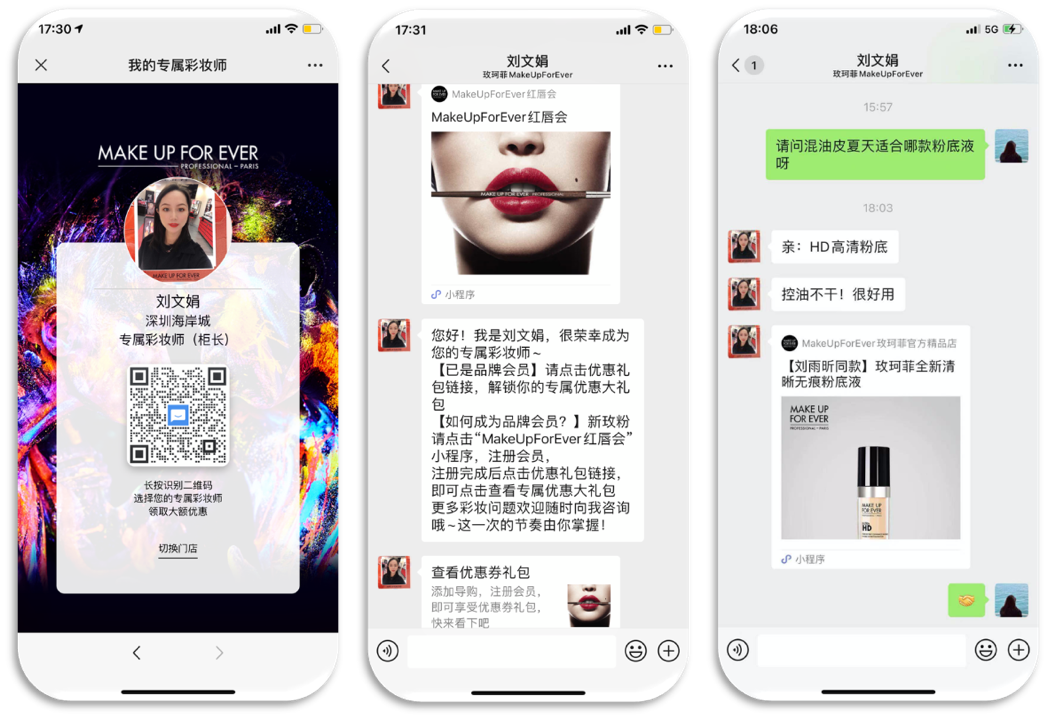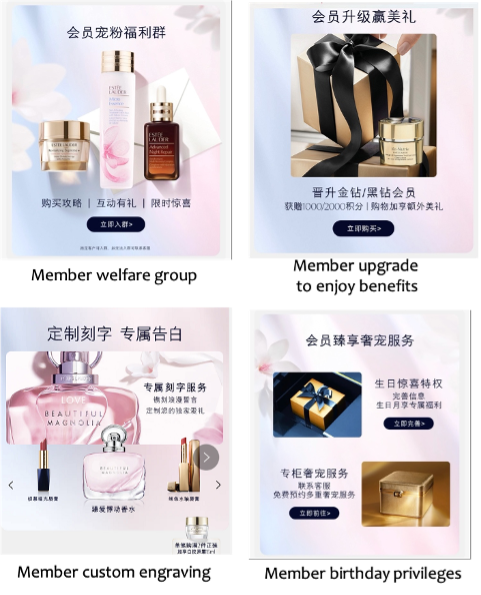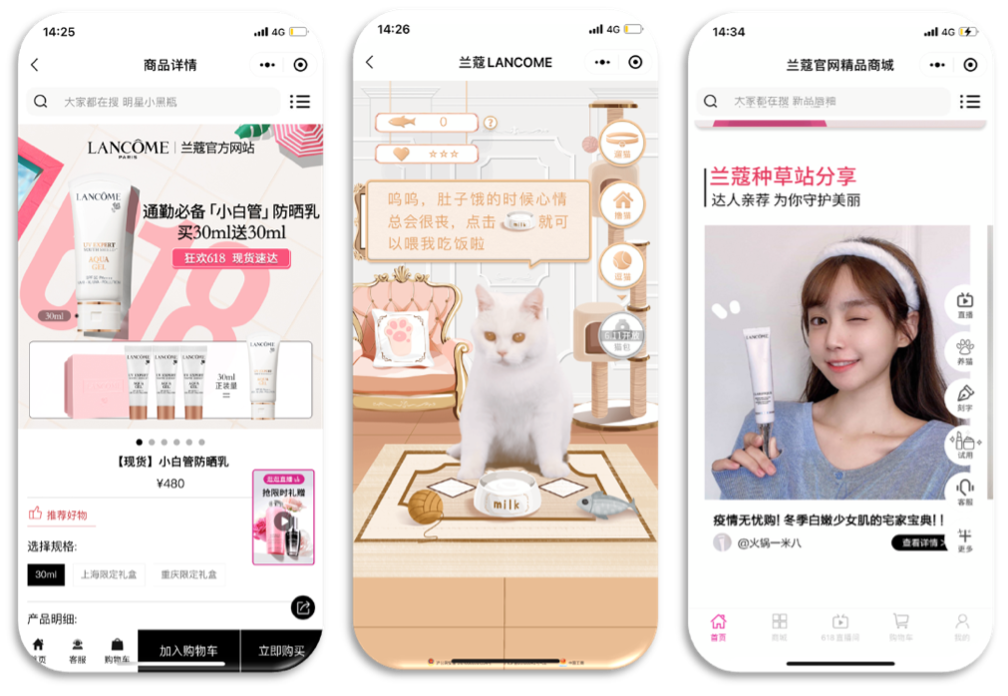WeChat Private Domain Became Essential to Beauty Brands in China
by Queenie Yao & Davy Huang
This article is also available on Beauty Matter.
As global beauty brands seize opportunities to sell to China, they are focusing on increasingly digital-savvy Chinese consumers who turn to the popular social media platform WeChat to follow brands’ activities. With the increasing cost of online traffic acquisition in China, the term 'private traffic' (私域流量) has emerged as a top marketing buzzword. The Western equivalent of private traffic would be an email list as an owned media channel.
However, in China, people rarely visit websites or use email. That’s why retailers and brands have begun seeking ways to establish their customer base by creating a private domain on social media platforms. The advantage of developing private traffic is that the brand can use it repeatedly, and can reach users within their private domain for free or at a limited cost. Compared with Chinese e-commerce sites like Taobao and JD.com, which act as public traffic platforms, private traffic belongs to brands' or businesses' "private assets."
Brands are already benefiting with private domain operation in China: Estée Lauder achieved a 100% increase in gross merchandise value (GMV) year-over-year (YoY) in its WeChat mini-program. The beauty brand also earned a 600% rise in GMV YoY in the WeChat livestream room during China’s 6.18 shopping bonanza, contributed by active customers in various WeChat Groups, WeCom Connections, and subscribers of the official account of Estée Lauder.
The article showcases how leading beauty players, such as Lancôme, Estée Lauder, and Make Up For Ever leverage private traffic to improve performance results in this large, lucrative market.
Make Up For Ever 1:1 customized service enhances the customer experience
Private traffic is particularly powerful on WeChat, which has attracted 1.2 billion monthly active users, who are interconnected and forming a closer personal network. Developing a private domain within WeChat can enhance the customer journey, making e-commerce efforts more efficient. For instance, WeChat Work (also known as WeCom) allows targeted, direct communications to connected customers.
Make Up For Ever (MUFE) is leveraging WeChat Work to attract customer traffic and promote campaigns.

<MUFE beauty advisor recommends specific items to consumers >
Source: Private Traffic for China Retail in 2021 Whitepaper, Azoya
At first, MUFE put their WeChat Work account QR code at the bottom of a public account article. Users who scan this QR code can add MUFE's staff as a WeChat contact; then the staff will send greetings and registration guidance to new followers. Users click on the link to register as a brand's member and get the coupon.
MUFE's staff position themselves as personal makeup consultants, who serve as a product seeding and recommendation ambassador, a brand and make-up teacher, and a personal beauty advisor to offer services, as needed. They are the active brand representatives sharing brand knowledge, engaging in 1:1 personal conversations, and guiding customers to the mini-program shop through daily interactions.
Personal consultants provide professional care advice and cosmetic recommendations according to the different skin types of different customers. When a customer is not sure which foundation is right for her combined skin type, the personal consultant provides a specific foundation item and makeup tips based on the customer's demand and inquiry. When a personal consultant recommends the product and sends a tracked link, it will direct customers to the mini-program shop to complete the purchase.
Dedicated customer service shortens customer’s product exploration and decision-making process. Customers do not need to search elsewhere to learn how to use the product or for any precautions. The personal consultant has a strong product seeding, brand education capacity and converts customer engagement to sales quickly.
Estée Lauder engages customers with the SCRM program in WeChat
After reaching specific customers and establishing a private domain in WeChat, Estée Lauder developed a social customer relationship management (SCRM) membership program that allows users to collect and burn points. The system combines online and offline sales data – so it does not matter whether customers shop online or offline; they will always get the points.
This CRM WeChat mini-program offers various benefits for customers: membership only, upgrade gifts, customized engraving, birthday privileges. Among these benefits, points redemption is one of the best ways to increase member loyalty. Estée Lauder points can be redeemed for vouchers or full-size products. The items redeemed for Estée Lauder points are different in each time period, and the number of points is different for different products.
Designing gifts or prizes that can attract customer participation is the crucial first step. This can effectively improve customers' sense of belonging and increase their likelihood of repeat purchases.
Building a membership tier that offers high perceived value and elevates the customer experience are also part of the SCRM strategies of Estée Lauder. The brand divides membership into four tiers, from entry level to the highest tier. Each has its own color system: pink diamond, blue diamond, gold diamond, and black diamond. Each tier has its own points limit and qualifications, and comes with a unique offer that matches the value of the membership.

<Estée Lauder’s various membership offerings>
Source: Private Traffic for China Retail in 2021 Whitepaper, Azoya
Combine with WeChat, Estée Lauder launches member welfare groups towards its registered members with special incentives. Within the group chat, members receive extra benefits like exclusive rewards, product purchase tips and limited-time gifts with purchase. This attracts high-value customers and increases their loyalty towards the brand.
During China’s annual 618 shopping event, Estée Lauder had an outstanding performance. The GMV of the mini-program increased by more than 100% compared to last year according to WeChat Official[1]. The total sales of the Estée Lauder mini-program recorded a 600% YoY surge driven by the self-broadcast sessions.
Through the official account, key opinion leader (KOL) livestream linkage, exclusive benefits for live-streaming, WeChat group chat, and other features, Estée Lauder is using private domain traffic to drive its performance multiplier. Estée Lauder's bet on private traffic is a good showcase, giving a reference to other high-end beauty brands seeking new traffic growth.
However, the CRM program is part of the essential feature of private traffic operations within WeChat, which is also embedded with other functions and features to make private traffic fun, interactive and lucrative.
Lancôme leverages gamification to build customer loyalty
Differentiating brands’ by offering novelty to customers is a good strategy to capture attention. Lancôme integrates gamification in its private domain operation, and elevates customer engagement with the brand. Brands are using WeChat gamification to leverage online and offline interaction and create an immersive space for interactive experiences.
Last June, Burberry built a virtual character within its WeChat mini-program for its Chinese customers. The most WOW-inspiring feature is that users can choose outfits for the virtual character – but first, they need to explore the mini-program shop to unlock the clothing selection. Gamification captures digital-savvy customers’ attention.

< Lancôme WeChat mini-program >
Lancôme leverages WeChat Moments Ads to reach potential customers, who then land at the mini-program campaign page to sign up for the program, and adopt a virtual cat after making their first order. Customers will need to earn virtual cat food by logging in daily, sharing with friends, and purchasing products. Encouraging such frequent interaction embeds the brand into consumers’ daily habits.
During this year’s 618 shopping event, brand partner Hello Kitty gave Lancôme’s hydrating and soothing toner a new look – for limited time only and exclusively available in China. In line with this collaboration, Lancôme chose to use ‘Cat’ as its first-ever virtual character.
Also, the cat character is more accurate to reach the target young female consumers, who are the main cat-owning demographic, according to a pet economy report[1] by QuestMobile.
Such gamification enabled by WeChat mini-program encourages customers to interact with the brand, and engage on a daily basis. Unlike most retailers that use physical products or currency as incentives for repeat shopping and purchase, gamification powered retention mainly leverages the perceived value of digital benefits.
Lancôme also created a built-in community for content on its mini-program store: a product seeding page. For the product seeding session, key opinion consumers (KOCs) or beauty influencers are invited to share their experiences on Lancôme’s products. The format looks a bit like snapshots from Little Red Book, including personal comments and reviews.
WeChat ecosystem is increasingly e-commerce-friendly
WeChat is a dominantly popular mega-app, providing a complete infrastructure for private traffic. According to Sensors Data[1], the average daily usage of the WeChat ecosystem accounts for nearly one-fifth of users' daily usage frequency of mobile products. This means the WeChat ecosystem strongly related to lifestyle habits enables brands to naturally access a vast traffic base.
Thanks to the gradual maturity and stability of WeChat ecosystem, the whole customer journey – acquisition, activation, and retention – can be completed in WeChat. Overall, WeChat mini-program and WeChat Pay solution have been critical to the success of e-commerce businesses on WeChat. WeChat mini-program is increasingly functional, as a single destination for e-commerce basics, promotion tools and social interaction. It caters to brands’ demand in multiple scenarios to fuel consumption.
WeChat Pay acts as an indispensable pillar to support brands with payment and marketing offerings. More than undertaking seamless payment in WeChat, WeChat Pay creates a channel for merchants to release discounts and coupons – boosting sales conversion. Lastly, the overall atmosphere of the private domain is better, and consumers have a better buying experience. For certain, over 70% of consumers are more willing to repurchase and share in the private domain.
Key Takeaways
· When user attention is increasingly divided among major apps, private traffic can help brands build more vertical, efficient, and sticky customer acquisition channels.
· The advantage of developing private traffic is that the brand can leverage it repeatedly, and can reach users within their private domain for free, or at a limited cost.
· Beauty brands are becoming increasingly reliant on WeChat to reach shoppers, while consumers are more willing to purchase and share in the private domain.
The whitepaper outlines specific private traffic tactics that can boost e-commerce profitability by enhancing loyalty to maximize lifetime value per customer.
[1] WeChat: Tecent Smart Retail Insight, July 2021; URL
[2] QuestMobile: The Pet Economy Insight, 2020; URL
[3] Sensors Data: Panoramic Interpretation of Operations in WeChat Ecosystem, 2020; URL